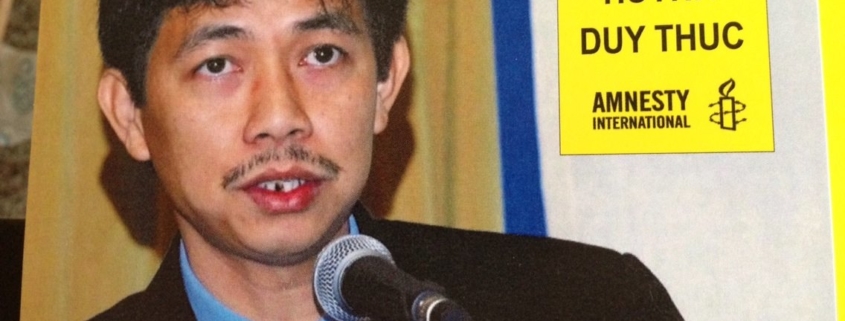HUMAN RIGHTS & CIVIL SOCIETY
Prisoners of Conscience

May 24, 2017 marks eight years since blogger and entrepreneur Trần Huỳnh Duy Thức was arrested by the Vietnamese authorities. Family, supporters, and the international community continue to rally around him. Amnesty International released a letter from twelve directors ahead of the anniversary, urging the Vietnamese government to release Thức immediately and quash his conviction, or in the alternative, to treat him with respect while he is still imprisoned. The 88 Project echoes this appeal, firmly believing that Thức should be released unconditionally and be allowed to remain in Vietnam upon his release.

Lê Thanh Tùng (left) and Trần Anh Kim (right) at their trial in December 2016
Trần Anh Kim and Lê Thanh Tùng’s appeal trial took place on May 26 in Thái Bình province, but the court of appeal upheld the first instance court’s heavy sentences: 13 and 12 years of imprisonment for Kim and Tùng, respectively, under Art. 79 of the Criminal Code (“activities aiming at overthrowing the people’s government”). The two dissidents are former prisoners of conscience who were released in 2015 and re-arrested later in the same year. “The men are accused of preparing to launch the ‘National Force to Launch the Democracy Flag’ group, an organization the authorities claim was an attempt to link up dissatisfied soldiers and former members of the ousted South Vietnamese military in an effort to foment a revolution. They claim innocence because they had only planned to launch the association, but hadn’t officially organized, and also call the charges against them a violation of the right to freedom of speech and association in Vietnam.”

Check out this video by Front Line Defenders about former prisoner of conscience Phạm Thanh Nghiên, a finalist for the 2017 Front Line Defenders Award for Human Rights, to learn more about her and the struggle of Vietnamese political activists.
Civil Society & Political Activists
Criminal Code Reform
The 2015 Criminal and Criminal Procedure Codes, the implementation of which was suspended last July for substantive errors, are back on the legislative floor for amendment debates this week. Check out the U.N. Recommendations on the 2015 Criminal Code and Criminal Procedural Code of Viet Nam in which the U.N. raises concerns regarding selected provisions that are incompatible with the international law of human rights.
In particular, concerning the 2015 Criminal Code’s provisions on “crimes infringing national security”: “These provisions do not differentiate between use of violent means, which should be prohibited, and legitimate peaceful activities to protest, express one’s opinion, including criticism of the Government’s policies and actions, or advocate for any kind of changes, including of the political system, which directly fall under the rights to freedom of expression, opinion, assembly, religion as well as participation in public life, and as such should be guaranteed and protected in accordance with international human rights law (articles 18, 19, 21 and 25 of ICCPR).”
And, concerning the provisions on prolonged incommunicado pre-trial detention in cases related to national security in the 2015 Criminal Procedure Code: “As a result of the combined provisions of articles 119, 172, 173 and 74 of the 2015 Criminal Procedural Code, a person accused of having committed a national security crime such as articles 109, 116 and 117, can be detained incommunicado for a prolonged and even indefinite period of time without a trial.”
Another controversial provision of the 2015 Criminal Code that provoked heated debate at the National Assembly this week is Art. 19, Clause 3 which holds a defense counsel criminally accountable for not denouncing his/her own client’s “national security crimes”… It’s already difficult enough for human rights lawyers to do their job in Vietnam. With this kind of provision, no lawyer would want to take on the defense counsel role for political dissidents and human rights defenders anymore.
Death Penalty
State of secrecy on death row in Vietnam: “Vietnam continues to classify figures on the death penalty as state secrets. What is known is that 18 offences still carry death – including drugs, murder and ‘threats against national security’. […]A leaked government report from the Ministry of Public Security earlier this year revealed [that the use of capital punishment] was worse than feared. According to the January 2017 report, 429 people had been executed between August 2013 and June 2016. As of July 2016, 681 people remained on death row. No explanation was provided as to why people were executed.”
Refugees & Asylum Seekers
“Forced” Montagnard TV confessions aired on Vietnamese television: “A video has emerged on Vietnamese television of Montagnards making ‘confessions,’ just weeks after a rights group claimed the returned refugees had been forced by the Hanoi government to take part in such interviews. […] Y-Duong Mlo was among 25 Montagnards authorities returned to Vietnam last month after failing to achieve refugee status in Cambodia. A video uploaded to YouTube by a channel that translates as ‘Security and Order Dak Lak’ on May 13 shows Mr. Mlo apologizing for his actions and depicting Cambodia as a dire place for Montagnards—also referred to as Degar and Dega.” This, sadly, is a sign that the Montagnards asylum seekers who were forced to return to Vietnam are not being left alone by the authorities.
Meanwhile, UNHCR representatives announced they would question the Cambodian government over their rejection of many Montagnards’ asylum applications: “UNHCR, the U.N.’s refugee agency, will question the government over its decision to deny asylum to the majority of Montagnards left in Cambodia, officials said, a month after the group was criticized for its role in repatriating some of the asylum-seekers to Vietnam.”
|








